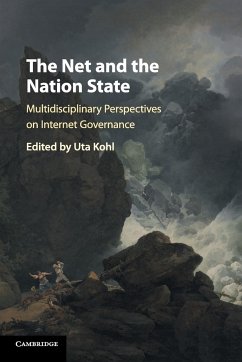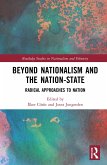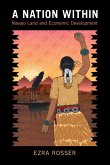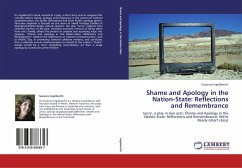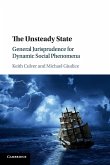The Net and the Nation State
Herausgeber: Kohl, Uta
The Net and the Nation State
Herausgeber: Kohl, Uta
- Broschiertes Buch
- Merkliste
- Auf die Merkliste
- Bewerten Bewerten
- Teilen
- Produkt teilen
- Produkterinnerung
- Produkterinnerung
Can the nation state survive the internet? Or will the internet be territorially fragmented along state boundaries? This book investigates these questions.
Andere Kunden interessierten sich auch für
![Beyond Nationalism and the Nation-State Beyond Nationalism and the Nation-State]() Beyond Nationalism and the Nation-State195,99 €
Beyond Nationalism and the Nation-State195,99 €![A Nation Within A Nation Within]() Ezra RosserA Nation Within39,99 €
Ezra RosserA Nation Within39,99 €![A Nation Within A Nation Within]() Ezra RosserA Nation Within111,99 €
Ezra RosserA Nation Within111,99 €![Shame and Apology in the Nation-State: Reflections and Remembrance Shame and Apology in the Nation-State: Reflections and Remembrance]() Suzanne IngelbrechtShame and Apology in the Nation-State: Reflections and Remembrance52,99 €
Suzanne IngelbrechtShame and Apology in the Nation-State: Reflections and Remembrance52,99 €![A Reader on Net Neutrality and Restoring Internet Freedom A Reader on Net Neutrality and Restoring Internet Freedom]() Randolph J. MayA Reader on Net Neutrality and Restoring Internet Freedom15,99 €
Randolph J. MayA Reader on Net Neutrality and Restoring Internet Freedom15,99 €![The Unsteady State The Unsteady State]() Keith CulverThe Unsteady State38,99 €
Keith CulverThe Unsteady State38,99 €![The Unsteady State The Unsteady State]() Keith CulverThe Unsteady State116,99 €
Keith CulverThe Unsteady State116,99 €-
-
-
Can the nation state survive the internet? Or will the internet be territorially fragmented along state boundaries? This book investigates these questions.
Hinweis: Dieser Artikel kann nur an eine deutsche Lieferadresse ausgeliefert werden.
Hinweis: Dieser Artikel kann nur an eine deutsche Lieferadresse ausgeliefert werden.
Produktdetails
- Produktdetails
- Verlag: Cambridge University Press
- Seitenzahl: 322
- Erscheinungstermin: 17. August 2018
- Englisch
- Abmessung: 229mm x 152mm x 18mm
- Gewicht: 469g
- ISBN-13: 9781316507612
- ISBN-10: 1316507610
- Artikelnr.: 53776316
- Herstellerkennzeichnung
- Libri GmbH
- Europaallee 1
- 36244 Bad Hersfeld
- gpsr@libri.de
- Verlag: Cambridge University Press
- Seitenzahl: 322
- Erscheinungstermin: 17. August 2018
- Englisch
- Abmessung: 229mm x 152mm x 18mm
- Gewicht: 469g
- ISBN-13: 9781316507612
- ISBN-10: 1316507610
- Artikelnr.: 53776316
- Herstellerkennzeichnung
- Libri GmbH
- Europaallee 1
- 36244 Bad Hersfeld
- gpsr@libri.de
1. Introduction. Internet governance and the resilience of the nation state
Uta Kohl and Carrie Fox; Part I. Competing Narratives: 2. The universal
norm of freedom of expression - towards an unfragmented internet: interview
with Guy Berger; 3. Which limits on freedom of expression are legitimate?
Divergence of free speech values in Europe and the US Jan Oster; 4. Nation
branding and internet governance: framing debates over freedom and
sovereignty Melissa Aronczyk and Stanislav Budnitsky; Part II. Solid and
Porous Cyberborders: 5. Gatekeeping practices in the Chinese social media
and the legitimacy challenge Lulu Wei; 6. Protecting gamblers or protecting
gambling? The economic dimension of borderless online 'speech' Christine
Hurt; 7. Where East meets West: censorship and cyberborders through EU data
protection law Uta Kohl and Diane Rowland; 8. Cyberborders through 'code':
an all or nothing affair? Dan Jerker B. Svantesson; 9. Cyberborders and the
right to travel in cyberspace Graham Smith; Part III. Unpacking Internet
Jurisdiction: 10. Alternative geographies of cyberspace Barney Warf; 11.
Polycentrism and democracy in internet governance Jan Aart Scholte; 12. The
end of territory? The re-emergence of community as a principle of
jurisdictional order in the internet era Cedric Ryngaert and Mark
Zoetekouw; 13. A space (partially) apart? Religious asylum and its lessons
for online governance Philippe Ségur; 14. Geoinformation, cartographic
(re)presentation and the nation state: a co-constitutive relation and its
transformation in the digital age Georg Glasze.
Uta Kohl and Carrie Fox; Part I. Competing Narratives: 2. The universal
norm of freedom of expression - towards an unfragmented internet: interview
with Guy Berger; 3. Which limits on freedom of expression are legitimate?
Divergence of free speech values in Europe and the US Jan Oster; 4. Nation
branding and internet governance: framing debates over freedom and
sovereignty Melissa Aronczyk and Stanislav Budnitsky; Part II. Solid and
Porous Cyberborders: 5. Gatekeeping practices in the Chinese social media
and the legitimacy challenge Lulu Wei; 6. Protecting gamblers or protecting
gambling? The economic dimension of borderless online 'speech' Christine
Hurt; 7. Where East meets West: censorship and cyberborders through EU data
protection law Uta Kohl and Diane Rowland; 8. Cyberborders through 'code':
an all or nothing affair? Dan Jerker B. Svantesson; 9. Cyberborders and the
right to travel in cyberspace Graham Smith; Part III. Unpacking Internet
Jurisdiction: 10. Alternative geographies of cyberspace Barney Warf; 11.
Polycentrism and democracy in internet governance Jan Aart Scholte; 12. The
end of territory? The re-emergence of community as a principle of
jurisdictional order in the internet era Cedric Ryngaert and Mark
Zoetekouw; 13. A space (partially) apart? Religious asylum and its lessons
for online governance Philippe Ségur; 14. Geoinformation, cartographic
(re)presentation and the nation state: a co-constitutive relation and its
transformation in the digital age Georg Glasze.
1. Introduction. Internet governance and the resilience of the nation state
Uta Kohl and Carrie Fox; Part I. Competing Narratives: 2. The universal
norm of freedom of expression - towards an unfragmented internet: interview
with Guy Berger; 3. Which limits on freedom of expression are legitimate?
Divergence of free speech values in Europe and the US Jan Oster; 4. Nation
branding and internet governance: framing debates over freedom and
sovereignty Melissa Aronczyk and Stanislav Budnitsky; Part II. Solid and
Porous Cyberborders: 5. Gatekeeping practices in the Chinese social media
and the legitimacy challenge Lulu Wei; 6. Protecting gamblers or protecting
gambling? The economic dimension of borderless online 'speech' Christine
Hurt; 7. Where East meets West: censorship and cyberborders through EU data
protection law Uta Kohl and Diane Rowland; 8. Cyberborders through 'code':
an all or nothing affair? Dan Jerker B. Svantesson; 9. Cyberborders and the
right to travel in cyberspace Graham Smith; Part III. Unpacking Internet
Jurisdiction: 10. Alternative geographies of cyberspace Barney Warf; 11.
Polycentrism and democracy in internet governance Jan Aart Scholte; 12. The
end of territory? The re-emergence of community as a principle of
jurisdictional order in the internet era Cedric Ryngaert and Mark
Zoetekouw; 13. A space (partially) apart? Religious asylum and its lessons
for online governance Philippe Ségur; 14. Geoinformation, cartographic
(re)presentation and the nation state: a co-constitutive relation and its
transformation in the digital age Georg Glasze.
Uta Kohl and Carrie Fox; Part I. Competing Narratives: 2. The universal
norm of freedom of expression - towards an unfragmented internet: interview
with Guy Berger; 3. Which limits on freedom of expression are legitimate?
Divergence of free speech values in Europe and the US Jan Oster; 4. Nation
branding and internet governance: framing debates over freedom and
sovereignty Melissa Aronczyk and Stanislav Budnitsky; Part II. Solid and
Porous Cyberborders: 5. Gatekeeping practices in the Chinese social media
and the legitimacy challenge Lulu Wei; 6. Protecting gamblers or protecting
gambling? The economic dimension of borderless online 'speech' Christine
Hurt; 7. Where East meets West: censorship and cyberborders through EU data
protection law Uta Kohl and Diane Rowland; 8. Cyberborders through 'code':
an all or nothing affair? Dan Jerker B. Svantesson; 9. Cyberborders and the
right to travel in cyberspace Graham Smith; Part III. Unpacking Internet
Jurisdiction: 10. Alternative geographies of cyberspace Barney Warf; 11.
Polycentrism and democracy in internet governance Jan Aart Scholte; 12. The
end of territory? The re-emergence of community as a principle of
jurisdictional order in the internet era Cedric Ryngaert and Mark
Zoetekouw; 13. A space (partially) apart? Religious asylum and its lessons
for online governance Philippe Ségur; 14. Geoinformation, cartographic
(re)presentation and the nation state: a co-constitutive relation and its
transformation in the digital age Georg Glasze.

